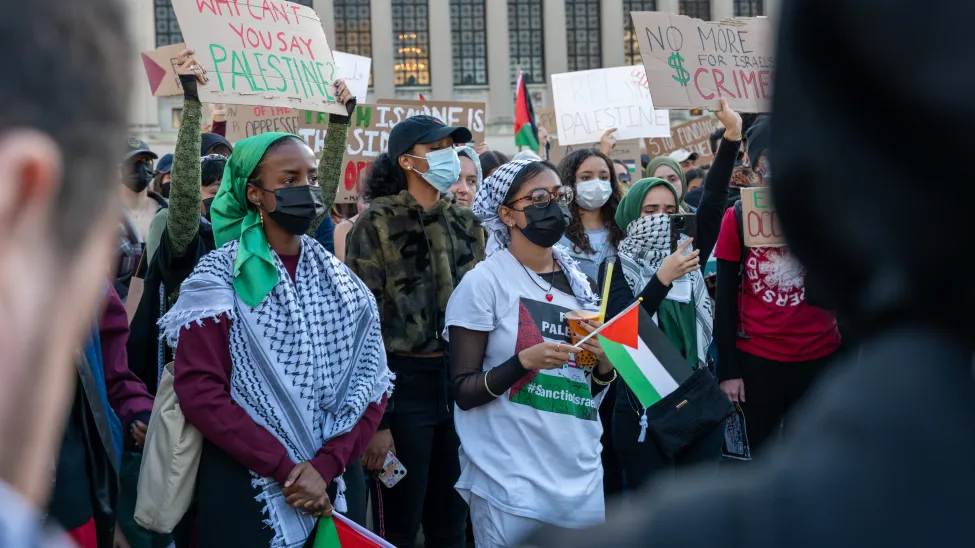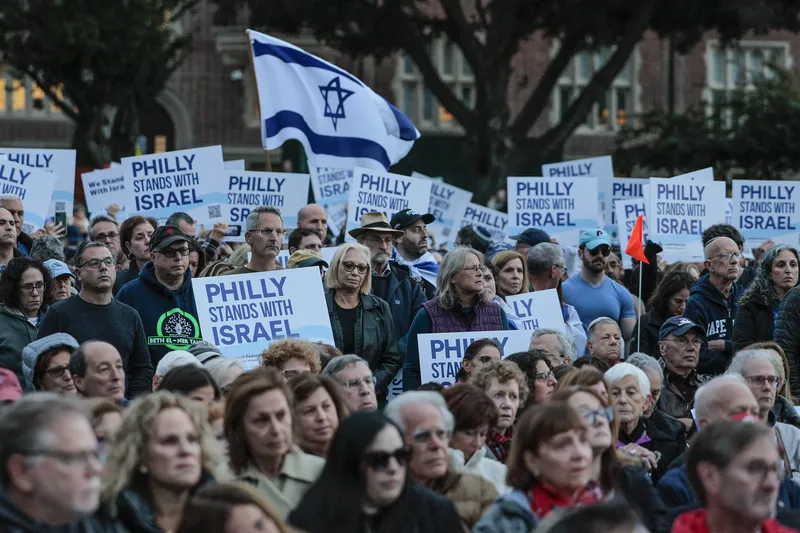Dissension on campuses over the Mideast makes for a teachable moment

As backers of Israel and Palestine mount increasingly strident opposing demonstrations on campuses and angry donors withhold their funds, educators find themselves in a bind more difficult than anything they’ve seen since the Vietnam War. For university leaders and academics, the Mideast war raises troubling issues of free speech and the teaching of history, and matters of simple civility. It even poses threats of physical danger.
Consider Columbia University, which cancelled its annual fundraising campaign because of turmoil on the campus. An Israeli student suffered minor injuries on Oct. 12 after a young woman hit him with a stick, breaking a finger, when he approached her as she tore down posters of Israelis kidnapped by Hamas in its Oct. 7 assault. The university also closed its campus to the public because of competing rallies on its grounds.
The school drew international headlines when Columbia business school professor, Shai Davidai, on Oct. 18 delivered an impassioned video in which he decried the university’s president for failing to speak out against student groups that support Hamas. Davidai, an Israeli, said such groups look on his 2-year-old and 7-year-old children as legitimate targets in the war. “You can be pro-Israel and pro-Palestine and anti-terror,” he said. “I know, because I am.”
On the same day, Columbia’s president, Minouche Shafik, appeared to strive for even-handedness in a statement:
“Unfortunately, some are using this moment to spread antisemitism, Islamophobia, bigotry against Palestinians and Israelis, and various other forms of hate,” said Shafik, an Egyptian-born British-American economist. “I have been disheartened that some of this abhorrent rhetoric is coming from members of our community, including members of our faculty and staff. Especially at a time of pain and anger, we must avoid language that vilifies, threatens, or stereotypes entire groups of people.”
While conspicuously avoiding any criticism of Hamas, she blasted so-called doxxing efforts, in which students have been shamed publicly for supporting statements that blamed Israel for the Hamas attack. A group recently drove a truck near the Columbia campus displaying the names and faces of such students on a mobile billboard. A similar truck had appeared near Harvard University and was condemned by the campus Hillel, among others.

Then there’s the University of Pennsylvania, where leading Jewish donors were first incensed about a Sept. 23 Palestinian literary conference that featured prominent antisemites and later were enraged at the administration’s slowness in condemning the Oct. 7 Hamas atrocities in southern Israel. University officials waited three days before issuing a statement calling the assault “horrific” and “abhorrent” – a reaction some donors regarded as too little, too late. Donors of tens of millions of dollars are now withholding funds and demanding that administrators resign.
Meanwhile, hundreds of Penn, Drexel and Temple University pro-Palestinian students on Oct. 25 rallied against what they argued was a lopsided pro-Israel atmosphere on their campuses. “Folks have to censor what they say,” a Drexel graduate student told The Philadelphia Inquirer. “They have to not speak about certain things because they’re afraid of how professors will react, they’re afraid of how the administration will react – and the reason this fear exists is because they’ve seen it happen to others.”
All this has been red meat for opportunistic politicians, who are calling for deportations of any students who support Hamas.
“In the wake of the attacks on Israel, Americans have been disgusted to see the open support for terrorists among the legions of foreign nationals on college campuses. They’re teaching your children hate,” former President Donald J. Trump said in a speech in Iowa. “Under the Trump administration, we will revoke the student visas of radical anti-American and antisemitic foreigners at our colleges and universities, and we will send them straight back home.”
Others parroted his sentiments. On “The Megyn Kelly Show,” Florida Gov. Ron DeSantis said that “any of those students who are here on visas, those visas should be canceled, and they should be repatriated back to their home country. That’s a no-brainer.” As reported by The Chronicle of Higher Education, he told a Fox News interviewer, “You don’t have a right to be here on a visa. You don’t have a right to be studying in the United States.”
Florida officials went even further. The head of the Florida state university system, Chancellor Ray Rodrigues, acting in conjunction with DeSantis, ordered campus chapters of Students for Justice in Palestine to shut down. Rodrigues’s letter said it was felony in Florida to support a terrorist organization. As reported by Inside Higher Ed, the University of Florida and the University of South Florida host such chapters, though other campuses may have chapters that are not recognized as official student organizations.
Several university officials, particularly in Ivy League schools, have been criticized either for refusing to condemn the terrorists who attacked Israel on Oct. 7 or for doing so late. This came in stark contrast to an email to alums from University of Florida President Ben Sasse, a former U.S. senator from Nebraska, who earned national attention for his blunt reaction shortly after the attack.
“I will not tiptoe around this simple fact: What Hamas did is evil and there is no defense for terrorism,” Sasse wrote. “This shouldn’t be hard. Sadly, too many people in elite academia have been so weakened by their moral confusion that, when they see videos of raped women, hear of a beheaded baby, or learn of a grandmother murdered in her home, the first reaction of some is to ‘provide context’ and try to blame the raped women, beheaded baby, or the murdered grandmother. In other grotesque cases, they express simple support for the terrorists.… This thinking isn’t just wrong, it’s sickening. It’s dehumanizing. It is beneath people called to educate our next generation of Americans.”
Sasse added that he expected anti-Israel demonstrations on campus, which he promised would be protected as a matter of free speech. And, indeed, pro-Palestinian students staged a walkout and demonstration on Oct. 25. During that protest, one man briefly tried to lead the chants, shouting, “Long Live Hamas,” the public radio station WUFT reported. But, as it reported: “The large crowd then became silent, with audible pushback coming from within the group. The man then left in anger.” An organizer said the man was not part of the event.
At some schools, such as Manhattan College and Fordham University, interfaith organizations have tried to bring pro-Palestinian and pro-Israel students together to try to find common ground, an effort met with mixed results, according to Inside Higher Ed. Fordham’s Muslim Student Association, for instance, refused to take part in a vigil planned after the Hamas attack as a symbol of solidarity with Palestinians, arguing that there have been no such vigils for long-suffering Palestinians.
As Israel bombards Gaza and seems to be inching toward an invasion aimed at uprooting Hamas, competing passions on university campuses are sure to grow. They will test the ability of university leaders to be morally clear about such matters as Hamas’s savagery, as well as compassion for Gazans who have long suffered under the terrorist group and who now are suffering more as a result of its actions.
Indeed, the war sadly raises the need on campuses for better education about the Mideast conflict, a bloody story of two peoples with legitimate claims to the same land – much as either might deny the other’s claim. Well-schooled academics should refute Palestinian claims that Israel is a case of “colonization” by Jews, who after all have been in the land for millennia. But they also need to recognize and teach about the rights of Palestinians who should be able to share the land.
Some of the most illuminating views on the Mideast recently have come from New York Times columnist Thomas Friedman, who touched on the campus demonstrations. He chided pro-Palestinian protesters for the “anti-colonial” pap they espouse, even as he criticized Israeli West Bank settlements that he has no use for. Friedman wrote: “These progressive demonstrators seem to believe that all of Israel is a colonial enterprise — not just the West Bank settlements — and therefore the Jewish people do not have the right either to self-determination or self-defense in their ancestral homeland, whether it’s within post-1967 borders or pre-1967 ones.”
“To reduce this incredibly complex struggle of two peoples for the same land to a colonial war is to commit intellectual fraud,” he wrote. “Or as the Israeli writer Yossi Klein Halevi put it in The Times of Israel on Wednesday: ‘To blame the occupation and its consequences wholly on Israel is to dismiss the history of Israeli peace offers and Palestinian rejection. To label Israel as one more colonialist creation is to distort the unique story of the homecoming of an uprooted people, a majority of whom were refugees from destroyed Jewish communities in the Middle East.’”
And then there are insightful scholars such as Ned Lazarus of George Washington University, an international affairs professor who had long worked for Seeds of Peace in Jerusalem. There, he promoted peaceful conflict resolution between Palestinians and Israelis, and he has since written extensively about Israeli-Palestinian peace-building efforts. He bemoans the loss of innocent lives in Gaza, but in clear-eyed fashion he fixes the blame for that squarely on Hamas.
In a recent Atlantic piece, Lazarus sadly wrote: “I don’t see how the cycle of hatred, killing, and suffering ends while there is a fundamentalist terrorist organization explicitly dedicated to the destruction of Israel and the killing of Jews—read its 1988 founding charter; the message is not subtle—equipped with legions of fighters ready to kill and die to achieve its goals, an arsenal of missiles, and a powerful state sponsor, Iran, that enables its violence and shares its explicitly genocidal agenda.”
The war is testing the rights of all on campuses to free speech, even when their arguments may be ill-informed, wrong-headed and blind to Hamas depravity. As the folks at the Foundation for Individual Rights and Expression put it, tearing down posters on campuses or otherwise stifling expression is misguided and unacceptable.
“While FIRE takes no stance on the Israeli-Palestinian conflict, we staunchly support free speech and oppose censorship in all its forms,” the group said. “In doing so, we oppose tearing down expressive materials and meeting speech with violence, no matter how upsetting public discourse or current events may be. Such tactics stifle debate and chill conversation, and they have no place anywhere in a free country, least of all on a college campus.”
Unsettling as the campus protests are, they also present a teaching moment for anyone who cares about innocents on both sides and who cares about history and justice. Some may argue that now is not the moment; emotions are running high and raw. But, if not now, when?


